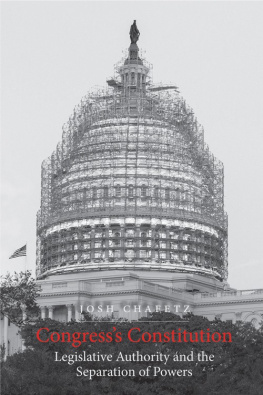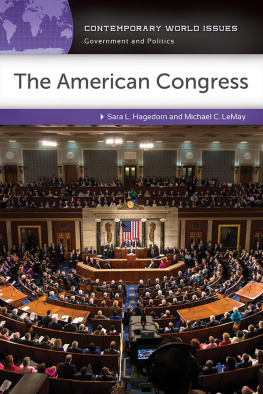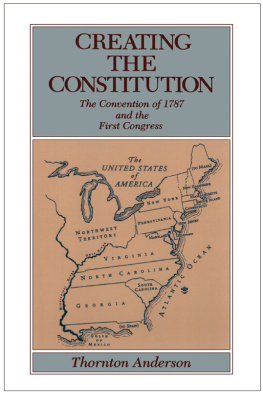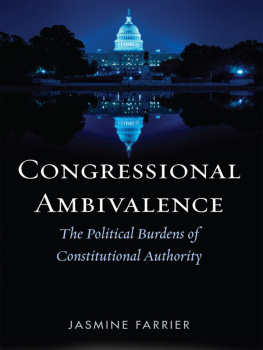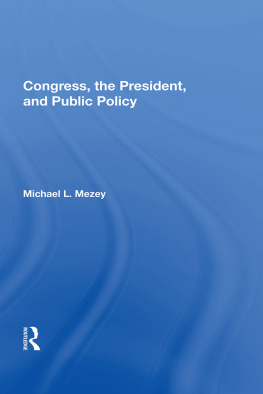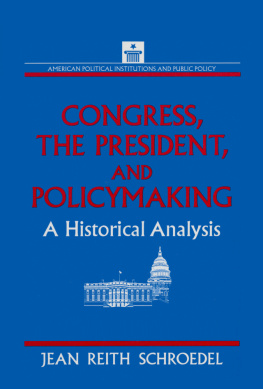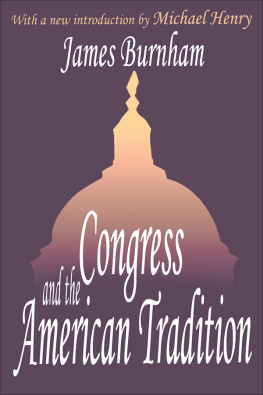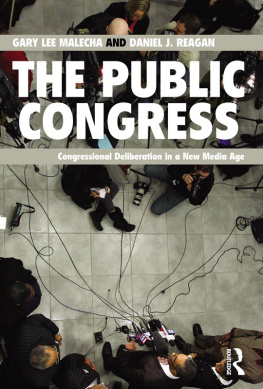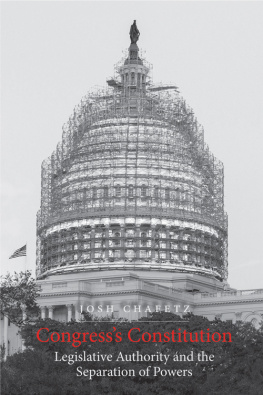CONGRESS S CONSTITUTION

Published with assistance from the Mary Cady Tew Memorial Fund.
Copyright 2017 by Josh Chafetz.
All rights reserved.
This book may not be reproduced, in whole or in part, including illustrations,
in any form (beyond that copying permitted by Sections 107 and 108 of the
U.S. Copyright Law and except by reviewers for the public press),
without written permission from the publishers.
Yale University Press books may be purchased in quantity for educational,
business, or promotional use. For information, please e-mail
(U.S. office) or
(U.K. office).
Set in Times Roman and Scala Sans type by IDS Infotech, Ltd.
Printed in the United States of America.
Library of Congress Control Number: 2016957903
ISBN 978-0-300-19710-5 (hardcover : alk. paper)
A catalogue record for this book is available from the British Library.
This paper meets the requirements of ANSI/NISO Z39.48-1992
(Permanence of Paper).
10 9 8 7 6 5 4 3 2 1
To Kate,
who vetoed a more extravagant dedication:
I love you.
CONTENTS
ACKNOWLEDGMENTS
I HAVE BEEN WORKING ON THIS PROJECT for quite some time. Indeed, as is perhaps typical, I was working on this project for some time before I was aware that I was working on this project. In any such lengthy endeavor, one accumulates innumerable debts, and I have been especially fortunate in having so many friends and colleagues who have contributed to the works progress and the authors well-being. This note merely acknowledges those debts; I am under no delusion that it even begins to repay them.
I presented portions of this project at the American Constitution Society Constitutional Law Schmooze, the Boston University Legal History Workshop, the Cornell Law and Libations Reading Group, the Cornell Law School Summer Workshop Series, the European Consortium for Political Research Standing Group on Regulatory Governance biennial conference, the London School of Economics Legal and Political Theory Forum, the Notre Dame London Law Centre, the University of Oxford Rothermere American Institute Research Seminar on Constitutional Thought and History, the University of Chicago Constitutional Law Workshop, the University of Houston Law Center Faculty Colloquium, the University of North Carolina School of Law Faculty Workshop, the University of Pennsylvania Law School Constitutional Law Speaker Series, the University of Richmond School of Law Faculty Colloquium, the William & Mary Law School Faculty Workshop, and the Yale-Duke Foreign Relations Law Roundtable. I am deeply grateful for the questions and comments I received at each of those events.
I am also immensely grateful for conversations with and feedback on various parts of the book from Akhil Amar, Shyam Balganesh, Joseph Blocher, Aaron Bruhl, Jessica Bulman-Pozen, Neal Devins, Mike Dorf, David Fontana, Aziz Huq, Mary Katzenstein, Randy Kozel, Corinna Lain, Marin Levy, Paul MacMahon, Gerard Magliocca, Bill Marshall, Aziz Rana, Richard Re, Pat Sandman, Rogers Smith, David Strauss, Sid Tarrow, Kevin Walsh, Justin Zaremby, and Mariah Zeisberg. David Pozen went far above and beyond the calls of duty and friendship by reading the entire manuscript and giving detailed and immensely helpful comments. Also tremendously helpful were the comments from anonymous reviewers for Yale University Press. Bill Frucht, Karen Olson, and Mary Pasti at the Press have been helpful and supportive at every step, as has Otto Bohlmann.
I am deeply grateful to the librarians at Cornell Law School, who have diligently tracked down every source I could possibly need for this project. Thanks also to Jessica Barragan, Arthur Kutoroff, Phuc Le, Adam McCall, Samantha Ostrom, and Gerry Scott, who provided first-rate research assistance.
This book is, in some loose sense, an expansion of my article Congresss Constitution, 160 U. Pa. L. Rev. 715 (2012), and paragraphs here and there from that article have survived into the finished manuscript.. Please consider my acknowledgments in those articles incorporated by reference here.
The further I progress into my career as a scholar, the more I realize how incredibly fortunate I have been in my mentors. Three, especially, have made indelible marks on my life and work. In the order in which they came into my life, they are Rogers Smith, Akhil Amar, and Guido Calabresi. Their influences are all over this workprobably in many places that I dont even realizeand I am deeply and ever increasingly grateful for their wisdom, their support, their guidance, and their friendship.
Finally, I am profoundly grateful to my father, Henry Chafetz, and to my parents-in-law, Janice Carlisle and Joseph Roach, all of whom have been wonderfully supportive and loving, as well as exemplars of scholarly achievement. Most importantly, I am grateful to my first reader, my partner in all things, and the love of my life, Catherine Roach. This book is for her.
Introduction
WHAT GOOD IS CONGRESS ? This is not a new question: less than three months into the First Congress in 1789, Fisher Ames, a representative from Massachusetts, wrote to a friend that he felt chagrined at the yawning listlessness of his colleagues.
But even if questioning the value of Congress is as old as the Republic, it has taken on new life in recent years, as talk of gridlock and dysfunction have come to dominate much of the public discourse around our national legislature. Complaints that the other branches have arrogated too much power to themselves abound, but almost no one looks to Congress for a solution. And so the question presents itself with renewed urgency: What good is Congress?
This book begins to answer that question by offering a new framework for thinking about congressional power in the American constitutional system. In particular, the book is interested in the ways that Congress and its constituent After all, legislation must meet Article I, section 7s bicameralism and presentment requirements. If a president has enough allies in one house of Congress, then bills she opposes are unlikely to reach her desk; even if Congress can send such a bill to her desk, she can veto it, and vetoes are very seldom overridden. Moreover, legislation is subject to judicial interpretation and judicial review. If a court, especially the Supreme Court, disapproves of a statute, it can strike it down or interpret it into near oblivion. For anyone concerned about the power of the other branches or about Congresss ability to press its own position as against theirs, then, legislation is a singularly unpromising route. The close identification of Congress with legislation, combined with the recognition of the limitations of legislation, is likely responsible in large part for complaints of congressional fecklessness.
As the following chapters demonstrate, however, the exclusively legislation-focused view of Congress is far too narrow. Congress has numerous powers other than the power to pass bills into law, powers that tend to receive scant treatment even in isolation; they are almost never grouped together and conceptualized as a coherent set of legislative tools. And yet these tools together are potent, giving Congress the ability to assert itself vigorously against the other branches.
In Richard Neustadts memorable phrase, the Constitution creates a government of separated institutions sharing powers. then begins the turn to Congress in particular, arguing that the legislature has both the motivation and the capacity to assert itself in the constitutional system as I have described it.
Building on the separation-of-powers theory laid out in considers the softer powers associated with the freedom of speech or debate, the disciplinary power over members, and the cameral rulemaking power. The reader is advised, however, not to mistake the books organizational schema for a strong analytic claim about the distinctness of hard and soft powers: they exist on a continuum. Indeed, it is one of the central contentions of this book that these powers are best understood as parts of a suite: it makes little sense to think of them in hermetically sealed categories. The division into hard and soft is primarily useful, I think, because it emphasizes an often-overlooked feature of congressional procedure: the powers falling along the softer end of the spectrum are frequently regarded (to the extent that they are thought of at all) as mere housekeeping measures. Describing them as soft powers helps to emphasize the generally neglected fact that they are significant sources of legislative power vis--vis the other branches.
Next page
